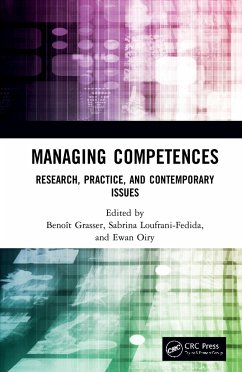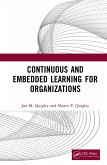Managing Competences
Research, Practice, and Contemporary Issues
Herausgeber: Grasser, Benoit; Oiry, Ewan; Loufrani-Fedida, Sabrina
Managing Competences
Research, Practice, and Contemporary Issues
Herausgeber: Grasser, Benoit; Oiry, Ewan; Loufrani-Fedida, Sabrina
- Gebundenes Buch
- Merkliste
- Auf die Merkliste
- Bewerten Bewerten
- Teilen
- Produkt teilen
- Produkterinnerung
- Produkterinnerung
This book draws together theoretical and practical research in competence management. It examines emerging and contemporary issues, such as the multilevel approach to competence, the development of collective competence, the strategies of competence management, the tools for managing competences, and the organizational dynamics of competences.
Andere Kunden interessierten sich auch für
![Driving Justice, Equity, Diversity, and Inclusion Driving Justice, Equity, Diversity, and Inclusion]() Kristina KohlDriving Justice, Equity, Diversity, and Inclusion186,99 €
Kristina KohlDriving Justice, Equity, Diversity, and Inclusion186,99 €![Continuous and Embedded Learning for Organizations Continuous and Embedded Learning for Organizations]() Jon M QuigleyContinuous and Embedded Learning for Organizations116,99 €
Jon M QuigleyContinuous and Embedded Learning for Organizations116,99 €![Management Lessons from the Great Explorers Management Lessons from the Great Explorers]() Ralph L KliemManagement Lessons from the Great Explorers153,99 €
Ralph L KliemManagement Lessons from the Great Explorers153,99 €![Enterprise Agility Enterprise Agility]() Gizem OzbayracEnterprise Agility155,99 €
Gizem OzbayracEnterprise Agility155,99 €![Implementing Project and Program Benefit Management Implementing Project and Program Benefit Management]() Kenn DolanImplementing Project and Program Benefit Management76,99 €
Kenn DolanImplementing Project and Program Benefit Management76,99 €![The Blendification System The Blendification System]() Daniel BruderThe Blendification System39,99 €
Daniel BruderThe Blendification System39,99 €![Project Management Hacking Project Management Hacking]() Douglas MartinProject Management Hacking115,99 €
Douglas MartinProject Management Hacking115,99 €-
-
-
This book draws together theoretical and practical research in competence management. It examines emerging and contemporary issues, such as the multilevel approach to competence, the development of collective competence, the strategies of competence management, the tools for managing competences, and the organizational dynamics of competences.
Hinweis: Dieser Artikel kann nur an eine deutsche Lieferadresse ausgeliefert werden.
Hinweis: Dieser Artikel kann nur an eine deutsche Lieferadresse ausgeliefert werden.
Produktdetails
- Produktdetails
- Verlag: CRC Press
- Seitenzahl: 266
- Erscheinungstermin: 30. Oktober 2020
- Englisch
- Abmessung: 239mm x 160mm x 20mm
- Gewicht: 544g
- ISBN-13: 9780367488925
- ISBN-10: 0367488922
- Artikelnr.: 60018504
- Herstellerkennzeichnung
- Libri GmbH
- Europaallee 1
- 36244 Bad Hersfeld
- gpsr@libri.de
- Verlag: CRC Press
- Seitenzahl: 266
- Erscheinungstermin: 30. Oktober 2020
- Englisch
- Abmessung: 239mm x 160mm x 20mm
- Gewicht: 544g
- ISBN-13: 9780367488925
- ISBN-10: 0367488922
- Artikelnr.: 60018504
- Herstellerkennzeichnung
- Libri GmbH
- Europaallee 1
- 36244 Bad Hersfeld
- gpsr@libri.de
Benoît Grasser is Full Professor in HRM at University of Lorraine in France. His current research topics are competence management, organizational routines and the dynamics of management tools. He has also published numerous articles or book chapters on the links between work, competences and organizational dynamics. In addition, he has also published handbooks on human resource management or organizational theory. Sabrina Loufrani-Fedida is Full Professor in HRM and project management at the Université Côte d'Azur in France. Her current research topics are competence and talent management, human resources communication, and development of project teams. Her work has appeared in international research journals such as Long Range Planning, International Journal of Project Management, International Business Review, and French famous reviews such as Revue de Gestion des Ressources Humaines. Ewan Oiry is Full Professor in HRM at Ecole des Sciences de Gestion - Université du Québec à Montréal (ESG-UQAM). His current research topics are competence management, HRM practices and policies and their link with firm strategies. He has published numerous articles or book chapters on these topics. For several years, he has managed a think-tank on "competence management" with Sabrina Loufrani-Fedida and Benoît Grasser; this think-tank brings together researchers in management, HRM and strategy, as well as consultants and HR Directors.
1. The Conceptual Travel of Competence: Building a Bridge between North
American and European Approaches. 2. Competency Management Tools: A
Paradoxical Longevity. 3. Competence as a Revelator of Blind Spots in the
Talent Management Literature. 4. Developing Soft Skills through Social
Learning: A Model Implemented at a Canadian Business School. 5.
Competences-Based Assessment of Employability: How to Deconstruct a Variety
of Interpretations and Articulations? 6. Together, Do We Go Further?: The
Dynamic between Rules and Collective Competence. 7. The Development of
Collective Competence with an Inter-Organizational Group: A Proximity
Perspective. 8. How to Organize Territorial Competence Management? 9.
Market for Competences: When Attractiveness Drives Competitiveness.
10. From the Transmission of Skills to the Concept of Competence: Lessons
from a Case Study in the Aerospace Industry. 11. Competences and Work
Contexts: Learning from the French Ergonomic Approach. 12. Situated
Individual Competences, Practices, and Institutional Logics: Identification
of Blended Practices among Front-Line Employees in a Railway Company. 13.
Social Innovation Processes and Collective Entrepreneurial Competence: The
Case of the Jardins de Cocagne (Cocagne Gardens). 14. Contextualizing
Intercultural Competencies: Genesis, Concepts, and Research Agenda.
Conclusion to the Handbook: Toward a Contextualized and Multilevel Approach
of Managing Competences.
American and European Approaches. 2. Competency Management Tools: A
Paradoxical Longevity. 3. Competence as a Revelator of Blind Spots in the
Talent Management Literature. 4. Developing Soft Skills through Social
Learning: A Model Implemented at a Canadian Business School. 5.
Competences-Based Assessment of Employability: How to Deconstruct a Variety
of Interpretations and Articulations? 6. Together, Do We Go Further?: The
Dynamic between Rules and Collective Competence. 7. The Development of
Collective Competence with an Inter-Organizational Group: A Proximity
Perspective. 8. How to Organize Territorial Competence Management? 9.
Market for Competences: When Attractiveness Drives Competitiveness.
10. From the Transmission of Skills to the Concept of Competence: Lessons
from a Case Study in the Aerospace Industry. 11. Competences and Work
Contexts: Learning from the French Ergonomic Approach. 12. Situated
Individual Competences, Practices, and Institutional Logics: Identification
of Blended Practices among Front-Line Employees in a Railway Company. 13.
Social Innovation Processes and Collective Entrepreneurial Competence: The
Case of the Jardins de Cocagne (Cocagne Gardens). 14. Contextualizing
Intercultural Competencies: Genesis, Concepts, and Research Agenda.
Conclusion to the Handbook: Toward a Contextualized and Multilevel Approach
of Managing Competences.
1. The Conceptual Travel of Competence: Building a Bridge between North
American and European Approaches. 2. Competency Management Tools: A
Paradoxical Longevity. 3. Competence as a Revelator of Blind Spots in the
Talent Management Literature. 4. Developing Soft Skills through Social
Learning: A Model Implemented at a Canadian Business School. 5.
Competences-Based Assessment of Employability: How to Deconstruct a Variety
of Interpretations and Articulations? 6. Together, Do We Go Further?: The
Dynamic between Rules and Collective Competence. 7. The Development of
Collective Competence with an Inter-Organizational Group: A Proximity
Perspective. 8. How to Organize Territorial Competence Management? 9.
Market for Competences: When Attractiveness Drives Competitiveness.
10. From the Transmission of Skills to the Concept of Competence: Lessons
from a Case Study in the Aerospace Industry. 11. Competences and Work
Contexts: Learning from the French Ergonomic Approach. 12. Situated
Individual Competences, Practices, and Institutional Logics: Identification
of Blended Practices among Front-Line Employees in a Railway Company. 13.
Social Innovation Processes and Collective Entrepreneurial Competence: The
Case of the Jardins de Cocagne (Cocagne Gardens). 14. Contextualizing
Intercultural Competencies: Genesis, Concepts, and Research Agenda.
Conclusion to the Handbook: Toward a Contextualized and Multilevel Approach
of Managing Competences.
American and European Approaches. 2. Competency Management Tools: A
Paradoxical Longevity. 3. Competence as a Revelator of Blind Spots in the
Talent Management Literature. 4. Developing Soft Skills through Social
Learning: A Model Implemented at a Canadian Business School. 5.
Competences-Based Assessment of Employability: How to Deconstruct a Variety
of Interpretations and Articulations? 6. Together, Do We Go Further?: The
Dynamic between Rules and Collective Competence. 7. The Development of
Collective Competence with an Inter-Organizational Group: A Proximity
Perspective. 8. How to Organize Territorial Competence Management? 9.
Market for Competences: When Attractiveness Drives Competitiveness.
10. From the Transmission of Skills to the Concept of Competence: Lessons
from a Case Study in the Aerospace Industry. 11. Competences and Work
Contexts: Learning from the French Ergonomic Approach. 12. Situated
Individual Competences, Practices, and Institutional Logics: Identification
of Blended Practices among Front-Line Employees in a Railway Company. 13.
Social Innovation Processes and Collective Entrepreneurial Competence: The
Case of the Jardins de Cocagne (Cocagne Gardens). 14. Contextualizing
Intercultural Competencies: Genesis, Concepts, and Research Agenda.
Conclusion to the Handbook: Toward a Contextualized and Multilevel Approach
of Managing Competences.








